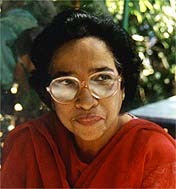On the Walk of Fame (Bonngasse) in Bonn,
is the faded star of Johanna Kinkel, trampled upon by thousands of pedestrians
every day. Most of them know nothing about this brilliant musician of the 19th
century, whose life unfortunately was not a song. Johanna was born on the 8th
of July 1810 in Bonn, to a couple of average means. Being aware of her love for
music, they arranged for her to study the piano under Franz Anton Reis, the man
who tutored Beethoven. Even as a teenager, she was an accompanist to other
musicians and also a coach to younger students.
When Johanna married Johann Paul
Mathieux a music bookseller from Cologne in 1832, little did she realise that
her life would be a living hell through physical and emotional abuse. She left
him six months later, but the trauma she had endured sent her into severe
depression. Her divorce came through several years later.
However, through the support of her
friends, she recovered enough to resume her musical career. Her meeting with
Mendelsohnn in1836 was a morale booster. He recognized her talent and
encouraged her to concentrate on music. She then moved to Berlin and continued
her musical studies under Karl Bohmer and William Taubert. To support herself,
she gave music tuitions to students.
As her musical prowess increased, she
acquired a measure of popularity among musicians of her day and was welcomed
into Literary circles. Her compositions were appreciated even by composers like
Robert Schumann.
Johanna returned to Bonn in 1839 in
connection with her divorce proceedings. Her popularity as a musician, writer
and composer were recognized by society. She was the first German woman
composer of her own choral group ‘Gesangverein.’
In 1842, Johanna married a Protestant
theologian, lecturer and poet called Gottfried Kinkel. Together they formed the
‘Maikäferbund’ – a group of poets. It was active from1840-1848 until the
Revolution started.
Gottfried dabbled in Politics. In 1848,
during the revolutionary upheaval in Germany, he was imprisoned in Berlin and
condemned to death for his political activities. But Johanna through her
influential friends, had the sentence overturned to life imprisonment. However,
Gottfried escaped from Spandau prison and sought asylum in London.
By now Johanna had borne Gottfried four
children. In 1851, she moved to London with them, to join her husband. The
Kinkel residence became the centre of the expat German community in London. But
Gottfried was totally immersed in Politics and had no time for his family.
Johanna was the sole breadwinner but also had to cope with household duties and
the care of her children. She not only taught music but became an author of
merit on musical subjects.She was also a composer and director of a choir. Her
reviews were regularly published in newspapers.
Rumours began floating around about
Gottfried’s infidelity. Perhaps this was what drove Johanna into depression
again. On Novenmer 8th 1858, her body was found in her garden, She
had fallen from her third floor apartment window. Was it a suicide? Was she
pushed by somebody else? The matter was never investigated. Her
autobiographical novel ‘Hans Ibeles’ was
published posthumously in London in1860. She was buried at Brookswood Cemetery
in Woking. Engraved on her tombstone were three simple words which summed up
her life - Freiheit, Liebe, Dichtung
(Freedom, Love, Poetry.)
On the 8th of July 2012 which
was Johanna’s 202nd birth anniversary, there were no celebrations in
Bonn. Pedestrians rushed over her Star of Fame unaware on whose face they trod.







